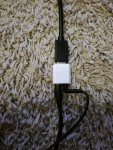fingerdance
New member
Hi, I have a new microphone and it has a electrical buzzing sound when i try to record using it. It is not the soft buzzing sound that can be removed, after searching up about it i realised that it should be the cause of ground loop. So i decided to buy a ground loop insolator for the problem but it still doesnt help. Does anyone have any experience or any idea to solve this?
Im using a laptop, a condenser microphone with 3.5mm head, i attach it to a usb sound card for the usb input, and a ground loop insolator.(Note. when i link the ground loop insolator the microphone isnt picking up any sound)
I suspect its the problem of the usb sound card because if i record without the microphone plugged to the sound card it still has the sound.
Thanks for helping
Im using a laptop, a condenser microphone with 3.5mm head, i attach it to a usb sound card for the usb input, and a ground loop insolator.(Note. when i link the ground loop insolator the microphone isnt picking up any sound)
I suspect its the problem of the usb sound card because if i record without the microphone plugged to the sound card it still has the sound.
Thanks for helping




